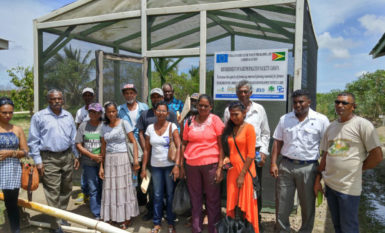Thirty-eight farmers recently received macro-propagation training for sweet potatoes and cassava and seedling production training for hot peppers from NAREI under the Agriculture Policy Programme (APP).
According to a press release from the National Agricultural Research and Extension Institute (NAREI), this exercise is the second phase of an agricultural diversification initiative to increase productivity and advance food security.
Participants, sixty-five percent of whom were female, comprised members of the Parika Farmers’ Group and the Laluni Farmers’ Group, the release said.
According to the release, this macro-propagation training session demonstrated to farmers how they could readily prepare their own planting materials.

The release explained that as part of the training, farmers were informed about the selection of proper planting materials and the rapid multiplication using the two nodes technique a simple and inexpensive technique that involves cutting the cassava stick in two and placing the halves into plastic bags or trays. With this technique, the release stated, a farmer could obtain three times the amount of planting materials than with the use of the traditional 8” stick.
According to the release, farmers also benefited from a sweet potato multiplication demonstration. This was specifically important since small scale farmers need a regular supply of good quality, virus free planting material. NAREI has been able to multiply and distribute small quantities of high quality, disease free sweet potato planting material, with the specific intent of improving the food security and nutrition of rural communities.
The release added that another aspect of the training was the construction of a seedling house, which included orientation (wind movements), height of and materials used to construct the roof, and potting mixture. The importance of a seedling house for hot pepper production was excessively emphasised during the training session.









